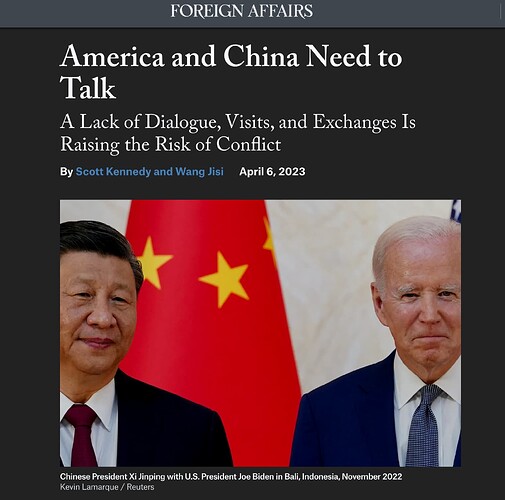-
美国和中国之间的关系已降至20世纪70年代初以来的最低点。
-
两国之间的经济相互依存关系正逐渐被技术限制、改变供应链路线的努力和对建立经济复原力的关注所瓦解。
-
由于新冠肺炎大流行病,两国之间的人际交往几乎完全消失了。
-
两位研究人员把他们的钱和口罩放在嘴边,忍受着在中国70天的隔离,在2022年的春天和秋天进行了长期访问。
-
他们与政府官员、企业高管、学者、记者和外国外交官会面,以了解双方关系的状况。
-
他们的访问为了解两国关系的状况提供了一个难得的窗口,显示出令人不安和令人欣慰的一面。
-
通往更具建设性的关系的道路在于重建两国之间深入和全面的社会互动的筋骨。
-
这包括人与人之间的联系,面对面的沟通,文化交流,以及实地考察和观察。
-
在过去三年中,美国出现了抗议活动、犯罪率上升和公众骚乱。
-
中国已经看到优先事项转向健康和福祉,空气污染和雾霾减少,以及上海长时间的封锁,导致公众抗议。
-
大流行病使两国相互孤立,并创造了一个回音室,硬生生地将美中竞争视为生存冲突的正统观点。
-
中国官员认为,美国正试图遏制、包围和压制中国,而美国的叙述则从所谓的对新疆和香港的干涉开始。
-
拜登政府继续对华为和其他科技公司征收关税和制裁。
-
两国对彼此的看法都很强硬,并将关系的恶化归咎于对方。
-
北京高度怀疑华盛顿是否接受中共统治的合法性并尊重中国的发展权利。华盛顿认为,中国的最高领导层坚定地要结束与美国的和谐共处时期,放弃亲市场的议程。
-
两国首都都有一种深刻的宿命论色彩,形成了一种自我强化的恶性循环,只要弥漫着一种不甘心的感觉,就可能证明不可能打破这种循环。这种观点是由于北京拒绝美国加入世界贸易组织的邀请,对中国公司进行不公平的补贴,限制美国公司进入中国市场,盗窃知识产权,以及侵略性的军事行动。
-
华盛顿的回应是指责北京想解体二战后建立在法治、基于市场的全球经济和美国联盟体系之上的国际秩序。双方都认为对方在改善关系方面没有什么可信度。
-
美国人对中国不谴责俄罗斯入侵乌克兰感到惊讶,一些人猜测北京已经事先得到了消息。
-
中国的精英们认为,俄罗斯的行动是由北约的扩张引起的,而中国官员和专家在如何应对方面存在分歧。
-
美国官员猜测,北京可能会利用其对乌克兰的关注,对台湾发动军事攻击。
-
美国的猜测可能是基于情报报告或中国社交媒体上呼吁中国军队 "解放 "台湾的帖子。
-
肯尼迪在北京的讨论中发现,乌克兰的战争使中国更加克制,因为一些中国军事人员认为华盛顿试图让北京陷入 "台湾陷阱 "中。
-
研究中国技术政策的专家指出,即使中国一枪不发地拿下台湾,也不会获得其半导体制造能力。
-
总之,文章认为,华盛顿和北京对俄罗斯和乌克兰之间的战争以及台湾海峡的紧张局势有着非常不同的看法。
-
中国的精英们认为北约的扩张挑起了俄罗斯在乌克兰的行动,而美国官员则猜测北京可能利用对乌克兰的关注对台湾发动军事攻击。
-
肯尼迪在北京发现,乌克兰战争使中国更加克制,因为一些中国军事人员认为华盛顿正试图让北京陷入 “台湾陷阱”。研究中国技术政策的专家也指出,即使中国不费一枪一弹拿下台湾,也无法获得其半导体制造能力。
-
为了稳定美国和中国之间的关系,需要有更多的对话和接触。两国施加的旅行限制需要取消,以便两国之间可以有更多的航班,机票的价格也需要降低。美国和中国的学生、学者、商人、医学专家和记者需要得到欢迎,他们的活动需要得到保护。
-
美国国会和中国全国人民代表大会的成员应该恢复对对方国家的旅行。中国官员需要访问美国的数据库、出版物和档案,美国需要为中国公民提供 "门户开放 "政策。应为官方对话预留合理的前提条件,并限制可接受的话题范围。
-
尽管很难乐观地认为这些步骤会被采取,但相互交谈和倾听将增加和平处理分歧的机会。更多的知识也可能强化负面的观点,加剧紧张局势,但为了重建人与人之间的联系,有必要采取这些步骤。
-
Relations between the United States and China have fallen to their lowest point since the early 1970s.
-
Economic interdependence between the two countries is gradually being dismantled by technology restrictions, efforts to reroute supply chains, and focus on building economic resilience.
-
People-to-people contact between the two countries has almost entirely vanished due to the COVID-19 pandemic.
-
Two researchers put their money and masks where their mouths are and endured 70 days of quarantine in China to make extended visits in the spring and fall of 2022.
-
They met with government officials, business executives, scholars, journalists, and foreign diplomats to get a sense of the state of the relationship.
-
Their visits offered a rare window into the state of the relationship and showed both disturbing and reassuring aspects.
-
The path to a more constructive relationship lies in rebuilding the sinews of deep and comprehensive social interaction between the two countries.
-
This includes people-to-people ties, face-to-face communication, cultural exchanges, and on-the-ground fieldwork and observation.
-
The US has seen protests, increased crime, and public unrest in the past three years.
-
China has seen a shift in priorities to health and well-being, a decrease in air pollution and smog, and a lengthy lockdown in Shanghai that led to public protest.
-
The pandemic isolated the two countries from each other and created an echo chamber that hardened into an orthodox view of US-China competition as an existential conflict.
-
Chinese officials believe that the US is trying to contain, surround, and suppress China, while the US narrative begins with alleged interference in Xinjiang and Hong Kong.
-
The Biden administration has continued tariffs and sanctions on Huawei and other tech firms.
-
Both countries have hardened their views of each other and blame the other for the deterioration in ties.
-
Beijing is highly skeptical that Washington accepts the legitimacy of CCP rule and respects China’s right to develop. Washington believes China’s top leadership is firmly set on ending the period of harmonious coexistence with the United States and abandoning the pro-market agenda.
-
There is a note of profound fatalism in both capitals, creating a self-reinforcing vicious cycle, and as long as a sense of resignation pervades, breaking it may prove impossible. This view is due to Beijing’s rejection of US invitation to join the World Trade Organization, unfair subsidization of Chinese companies, restriction of US companies access to China’s markets, intellectual property theft, and aggressive military moves.
-
Washington has responded by accusing Beijing of wanting to unravel the post-World War II international order built on the rule of law, a market-based global economy, and the US alliance system. Both sides believe the other has little credibility in regards to improving ties.
-
Americans were surprised by China’s lack of condemnation of Russia’s invasion of Ukraine, with some speculating that Beijing had been informed beforehand.
-
Chinese elites believed that Russia’s actions were prompted by NATO expansion, and there was disagreement among Chinese officials and experts on how to respond.
-
U.S. officials speculated that Beijing might take advantage of its focus on Ukraine to launch a military attack on Taiwan.
-
U.S. speculation could have been based on intelligence reports or Chinese social media posts calling for the Chinese military to “liberate” Taiwan.
-
Kennedy found in discussions in Beijing that the war in Ukraine was making China more restrained, as some Chinese military personnel believed Washington was trying to get Beijing bogged down in a “Taiwan trap.”
-
Experts on Chinese technology policy pointed out that even if China took Taiwan without firing a shot, it would not gain access to its semiconductor manufacturing capacity.
-
In conclusion, the article suggests that Washington and Beijing have very different views on the war between Russia and Ukraine and tensions in the Taiwan Strait.
-
Chinese elites believe NATO expansion provoked Russia’s actions in Ukraine, while U.S. officials speculate that Beijing might take advantage of its focus on Ukraine to launch a military a
-
- 列表条目
-
ttack on Taiwan.
-
Kennedy found in Beijing that the war in Ukraine was making China more restrained, as some Chinese military personnel believed Washington was trying to get Beijing bogged down in a “Taiwan trap.” Experts on Chinese technology policy also pointed out that even if China took Taiwan without firing a shot, it would not gain access to its semiconductor manufacturing capacity.
-
In order to stabilize relations between the U.S. and China, there needs to be more dialogue and contact. The travel restrictions imposed by both countries need to be lifted so that there can be more flights between the two countries, and the price of tickets needs to be lowered. American and Chinese students, scholars, businesspeople, medical experts, and journalists need to be welcomed and their activities need to be protected.
-
Members of the U.S. Congress and China’s National People’s Congress should resume trips to the other country. Chinese officials need access to U.S. databases, publications, and archives, and the U.S. needs to provide an “open door” policy for Chinese citizens. Reasonable preconditions and limits to the range of acceptable topics should be set aside for official dialogue.
-
Though it is difficult to be optimistic that these steps will be taken, talking and listening to each other will increase the chances of peacefully managing differences. More knowledge could also reinforce negative views and add to tensions, but it is necessary to take these steps in order to rebuild people-to-people links.
